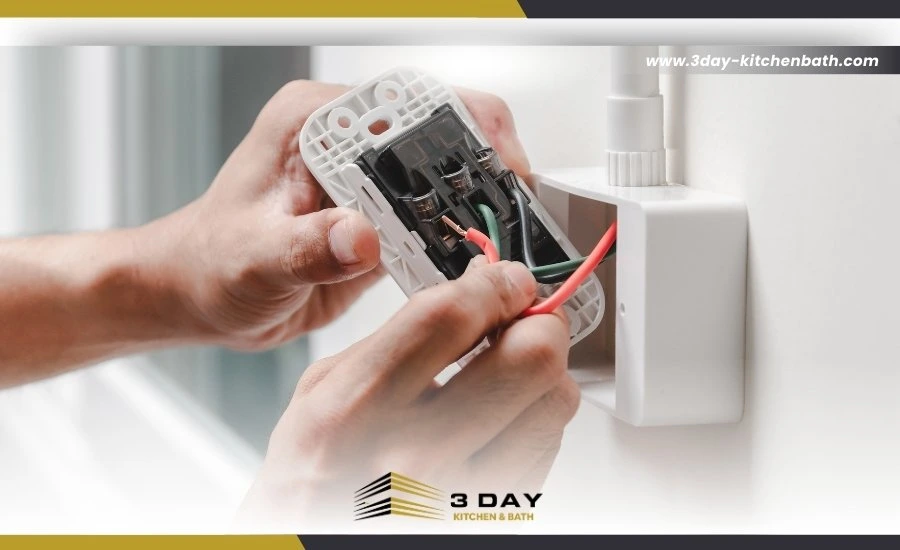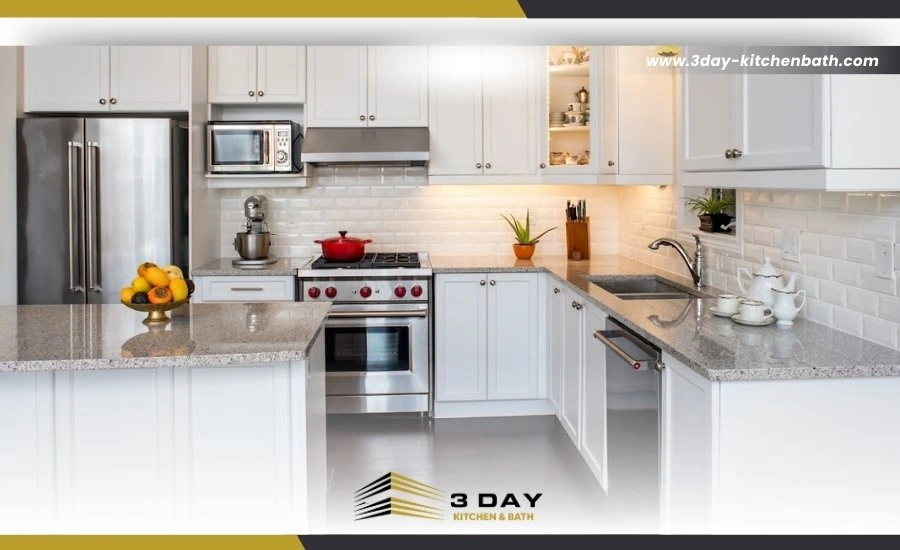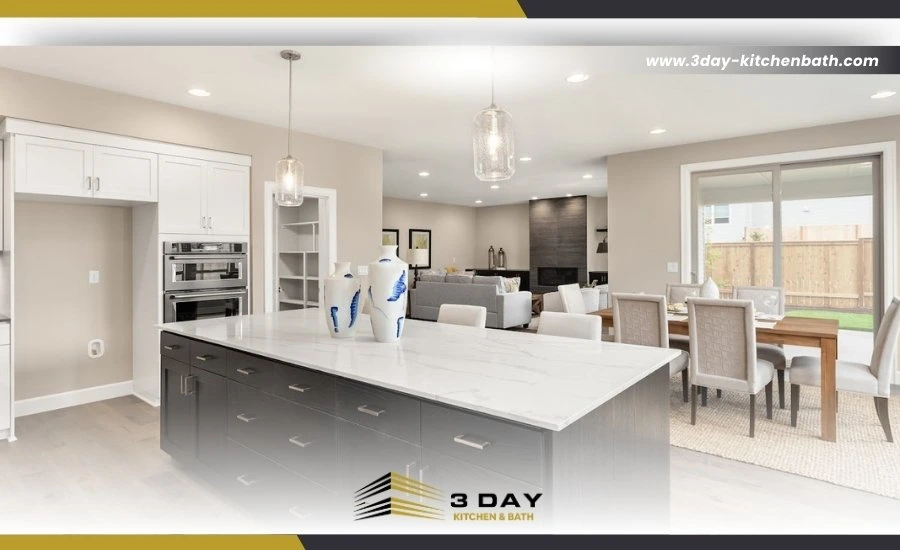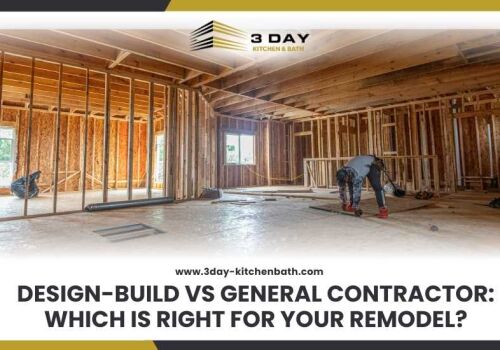- Why Permits Matter (And Yes, They Really Do!)
- Pros and Cons of Obtaining Permits
- Â
- Types of Kitchen Remodel Projects That Typically Require a Permit
- Â
- Projects That Usually Don't Need a Permit
- Â
- How to Check If You Need a Permit
- The Timeline of Obtaining a Permit
- What Happens if You Skip the Permit?
- Step-by-Step: How to Obtain a Kitchen Remodeling Permit
- The Importance of Permits for a Smooth Kitchen Remodel
- Frequently Asked Questions (FAQs)
- Do I need a permit if I'm just updating fixtures and appliances?
- Can I apply for a kitchen remodeling permit alone, or does my contractor need to do it?
- How much time does it usually take to get a kitchen remodeling permit?
- What happens if I remodel my kitchen without a permit?
- Are kitchen permits expensive?
- Ready to Start Your Kitchen Remodel? Let Us Guide You
Thinking about remodeling your kitchen? The excitement of envisioning a new layout, fresh cabinetry, and sparkling countertops can be exhilarating. But, before you grab that hammer (or even pick up the phone to call a contractor), there's a key question to consider: Do you need a permit to remodel your kitchen?
Now, I know what you're thinking. "A permit? For my kitchen? Can't I just go ahead and make my space exactly how I want it?" Let's dive into why home improvement permits matter and what you absolutely need to know to keep your kitchen renovation smooth and compliant with building codes and regulations.

Why Permits Matter (And Yes, They Really Do!)
First things first: permits aren't just another hoop to jump through. They exist to ensure safety, compliance, and to protect your investment. Think of them as a safeguard for you, your family, and anyone else who might own your home in the future.
At 3 Day Kitchen & Bath, we've seen our fair share of renovation projects here in San Diego. Every city has its own rules, and trust me, San Diego remodeling permits have a few unique aspects of their own. Permits ensure that your kitchen remodel compliance is in place, from safe electrical wiring to plumbing that won't cause a flood, and structural changes that don't compromise the integrity of your home.
Pros and Cons of Obtaining Permits
While permits provide essential benefits, they also come with certain drawbacks. Here's a quick overview to help you weigh the decision:
| Pros | Cons |
| Ensures Safety | Added Time |
| Permits ensure that all work, especially electrical and plumbing, meets safety standards, reducing risks for occupants. | Obtaining permits can extend project timelines, with approvals taking anywhere from a few days to several weeks. |
| Protects Home Value | Additional Costs |
| Permitted work meets local code, which can increase the home's value and avoid future devaluation from unpermitted work. | Permit fees and additional inspections can increase overall project costs. |
| Eases Resale Process | Potential Project Delays |
| When selling a home, potential buyers and lenders often request proof of permits for renovations, which helps streamline sales. | Unplanned corrections to meet code requirements can delay project progress if permits are not in order from the start. |
| Validates Insurance Coverage | Increased Bureaucracy |
| Permitted work is more likely to be covered by insurance, whereas unpermitted renovations could lead to denied claims. | Additional paperwork and inspections may feel cumbersome and require close coordination with the local building department. |
| Compliance with Local Codes | Inflexibility in Design |
| Permits ensure that renovations follow local building codes, which helps prevent fines and liabilities. | Some design aspects may need to be adjusted to meet code, which can impact original remodel plans. |
Types of Kitchen Remodel Projects That Typically Require a Permit
So, what kinds of projects actually need a licensed kitchen renovation permit? Generally, if you're making changes that alter the basic structure, plumbing, or electrical systems, you'll need a permit. Here's a breakdown:

- Structural Changes: Thinking about taking down a wall to open up your space? That's fantastic! But it's also a big structural change. Anytime you move walls, expand a room, or adjust the layout, you'll likely need a permit.
- Electrical Work: Kitchens are electrical hotspots—outlets for appliances, lighting, and even heated floors in some cases. Updating wiring or adding outlets? A permit helps ensure that the electrical work meets local code standards and is safe.
- Plumbing Changes: If you're moving the sink, dishwasher, or refrigerator, there's plumbing involved. A permit ensures that water lines and drainage systems are installed correctly to prevent leaks and water damage.
- Gas Line Installations: Are you adding a gas stove, or maybe you're swapping electric for gas? Extending or relocating gas lines requires a permit. Safety is non-negotiable with gas lines.
- Major Appliance Installations: Large appliances—think vent hoods, dishwashers, or garbage disposals—often require a permit, especially if they involve new plumbing or wiring.
Fun Fact: Did you know that unpermitted work can affect your home's resale value? Potential buyers may ask about permits or even require retroactive ones to make the sale go through. In our experience, having all your permits in order can be a huge selling point.
Projects That Usually Don't Need a Permit
Not every little upgrade needs to go through the permit process. Here are a few improvements that are generally permit-free:

- Painting and Wallpapering: A fresh coat of paint? Go wild! This is one area where you can get creative without needing to file a single document.
- Cabinet Replacement: If you're just swapping out old cabinets for new ones without changing the layout, you're likely in the clear. But, remember, moving the cabinetry around could trigger a need for a permit.
- Countertop Installation: Replacing countertops? Usually, no permit required. However, if the installation involves heavy modifications, consult your contractor.
- Flooring Updates: New floors can refresh any kitchen, and, thankfully, no permit is usually required for this update.
- Cosmetic Changes: Backsplash, lighting fixtures, and hardware upgrades are usually fair game too. Unless you're rewiring or moving things around, go ahead and personalize your kitchen.
How to Check If You Need a Permit
You're now wondering, "Okay, so how do I know for sure?" The answer lies with your local building department. For those of us in San Diego, the city's website is a goldmine for permit information. Here's how you can get started:

- Reach Out to Your Local Building Department: Many cities have websites that outline what projects require permits. San Diego, for example, has a straightforward online permit guide.
- Ask Your Contractor: Trustworthy contractors know these rules inside and out. They can provide guidance based on your specific project and ensure compliance every step of the way.
- Consult Online Tools: Some municipalities have online permit tools. You can enter your project details to see if a permit is needed. Technology makes this easier than ever!
The Timeline of Obtaining a Permit
Now, let's talk about the nitty-gritty—how long does it take to get a permit? While every city varies, permit approvals can range from a few days to several weeks. This largely depends on the project's scope and the city's workload. Pro tip: Apply as early as possible to avoid delays.
What Happens if You Skip the Permit?
Skipping the permit may seem tempting to speed things up, but it can come with unexpected consequences. Here's what you could face if you don't have the proper permits:
- Fines and Penalties: If unpermitted work is discovered, you may face fines or be required to undo the remodel to bring it to code.
- Issues with Insurance: Many home insurance policies may not cover unpermitted work if an accident occurs.
- Resale Problems: Selling your home could become challenging, as potential buyers often request permits to ensure that previous work meets safety and quality standards.
Step-by-Step: How to Obtain a Kitchen Remodeling Permit
If your project requires a permit, here's a quick roadmap:
- Prepare Your Project Plan: Start by listing all planned changes, including any structural, plumbing, or electrical work, as part of a comprehensive remodeling plan.
- Gather Necessary Documentation: Obtain floor plans, contractor information, and any required project specifications.
- Submit a Complete Permit Application: Visit your local building department or their online portal to submit your application. Be sure to double-check that all details are accurate to avoid potential delays.
- Pay Application Fees: Review permit fees with your contractor or the building department to ensure that all costs are covered upfront.
- Arrange Initial Inspections: Once your permit is approved, schedule inspections with the building department to confirm that each phase of your project meets safety standards.
- Track Project Progress and Schedule Follow-Up Inspections: Monitor project milestones closely and arrange any additional inspections as required by your permit.
- Finalize and Close the Permit: Complete a final inspection to close your permit, ensuring that your remodel meets all local regulations and is fully approved.

The Importance of Permits for a Smooth Kitchen Remodel
Permits are an essential part of any significant kitchen remodel, protecting both your investment and your peace of mind. When you ask, "Do you need a permit to remodel a kitchen?" the answer is often yes, especially for structural, electrical, or plumbing work. Securing the necessary permits ensures your remodel meets local building codes and adheres to safety standards. By planning ahead, consulting with professionals, and understanding your project's specific requirements as outlined in our kitchen remodeling guide, you set yourself up for a successful remodel with fewer surprises.
Permits may feel like an extra step, but they add value to your home and can save you from potential setbacks or fines. Remember, a permitted kitchen remodel isn't just about compliance—it's about safeguarding your home, your family, and your financial investment.
Frequently Asked Questions (FAQs)
Do I need a permit if I'm just updating fixtures and appliances?
Simply updating fixtures or appliances often doesn't require a permit. However, check with your local building department if your upgrades involve rewiring or new plumbing.
Can I apply for a kitchen remodeling permit alone, or does my contractor need to do it?
You can apply for a permit on your own, but many contractors handle this as part of their service. If you're working with a contractor, they often take care of the permit process.
How much time does it usually take to get a kitchen remodeling permit?
Permit approval times vary based on project scope and local demand, ranging from a few days to several weeks. Applying early can help avoid delays.
What happens if I remodel my kitchen without a permit?
Remodeling without a permit can result in fines, insurance issues, and challenges when selling your home. Permits ensure compliance and protect your investment.
Are kitchen permits expensive?
Permit costs vary by location and project scope. While fees can be a factor, the long-term benefits and protection they provide often outweigh the initial expense.
Ready to Start Your Kitchen Remodel? Let Us Guide You
At 3 Day Kitchen & Bath in San Diego, CA, we're dedicated to making your remodeling journey as seamless as possible, including guiding you through the permit process with ease. From concept to completion, our team handles every detail to help you safely, legally, and beautifully transform your kitchen.
So, if you're ready to take the next step toward your dream kitchen, don't hesitate to reach out. Let our experience work for you and turn your vision into reality, hassle-free. Contact us today at (619) 558-6950 to get started on your kitchen remodel journey in San Diego!







